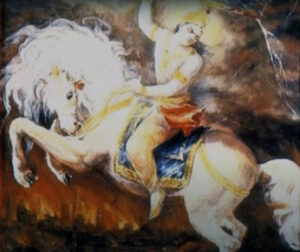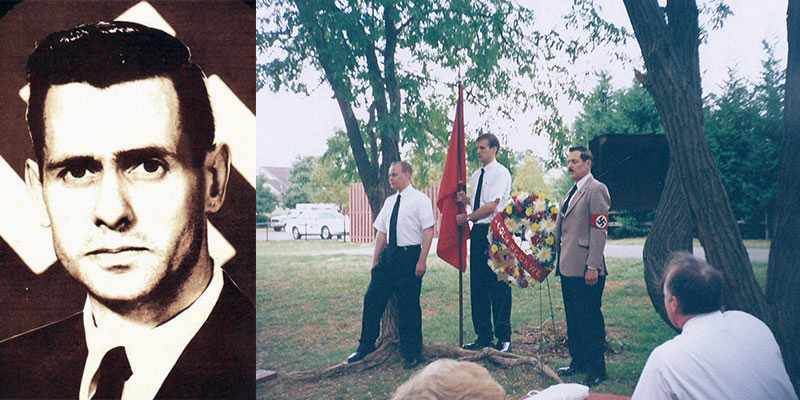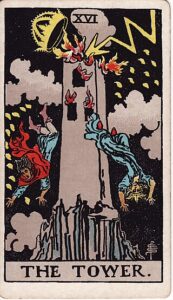and the Sun, 9
Their real enemies and their only enemies. Adolf Hitler has pointed out no others. (And that is precisely the reason why the whole world—this doomed Dark Age world, stricken with madness, which exalts its foes and kills its friends,—has risen against him like one man). The fact is too important not to deserve a thorough explanation.
Nothing is more unfair to National Socialism than the all-too-easy description of its inherent ‘Anti-Semitism’ as ‘a means intended to turn the German people’s attention away from their actual exploiters’ (meaning: the German capitalists), or, as a modern expression of the age-old ‘envy’ of the Goyim—of any Goyim—at the sight of the Jews’ undeniable success in business. The first assumption, brought forth ad nauseam by the Communists and their sympathisers,—reveals either a complete absence of good faith or a complete misunderstanding of the Jewish question as such and therefore of all serious, vital ‘Anti-Semitism.’ The latter may well be applied to Armenian ‘Anti-Semitism’ (or to that of any commercially clever Levantines, whose trickery the Jews alone are able to outdo). It has nothing whatsoever in common with the profound, biological and therefore irreducible hostility which opposes National Socialists and Jews.
No doubt, that hostility first burst out in a popular uproar in answer to all the tangible harm wrought by Jews against the German people during a few decades (and many a German whose family Jews had reduced to misery at the time of the inflation, after the first World War, welcomed the boisterous Anti-Semitism of the young Movement for personal no less than for national reasons); no doubt, the first thing that made Adolf Hitler himself a definitive enemy of the Jews was his knowledge of the anti-German part played by the latter, both politically and socially, in Austria and in Germany, already before 1914, in particular, his knowledge of the Jewish spirit and Jewish leadership of Marxism, and his awareness of the presence of Jews in the press, in the theatre, etc., behind all propaganda directly or indirectly aiming at the destruction of every healthy national instinct among people of German blood. In other words, National Socialist Anti-Semitism is—first—racial self-defence of the Aryan; a vigorous reaction against the mischief the Jews did (and are, by the way, since 1945, again doing) in an Aryan land.
But there is more—and much more—to be said. What the Jews did and do (and cannot but do) is a consequence of what they are—and of what they remain even when they turn their backs to Jewish tradition (or pretend to do so) and become Christians, Theosophists, Buddhists or just ‘rationalists,’ or Communists. And they are, fundamentally, irreducibly—already in the invisible Realm of which this world of shapes and colours and sounds is but a projection,—the polar opposite of the natural Aryan élite; the dark counterpart of the youngest Children of the Sun. As racially conscious as they, if not—alas!—often more so; as tightly bound as they to one another through the most compelling solidarity; through total solidarity (in practical—financial and political—no less than religious or so-called religious affairs) such as one can, in history, if at all, seldom come across; nay, as devoted as they to a merciless collective purpose. Only theirs is not the legitimate consciousness of true superiority and the blood-solidarity of Nature’s best ones; nay, it is not the healthy racial pride and patriotism of a real people in their place within the scheme of Life. Nor is their collective purpose by any means, like that of Adolf Hitler’s followers, ‘in harmony with the original meaning of things.’ On the contrary! For the Jews are, in the first place, not a race in the true sense of the ward,—let alone ‘God’s chosen one.’ They are neither an homogeneous variety of Semites nor a brotherhood of kindred Semitic types bearing to one another such a relation as that which binds together Aryans of ‘Nordic,’ ‘Dinaric’ and other types within the German nation. One needs but to look at them, in order to be convinced of this; nay, to look at them in the country where they have been gathering for the last thirty or forty years from all the ghettos of the world in the name of their common past and common nationhood: Palestine. One meets there, apart from the ‘classical’ Jew, Jews of all physical types, including the Slav, including the ‘Nordic’—rare,, no doubt, yet present and not necessarily marred by the well-known visible signs of Jewish descent. And some of the members of the strange pseudo-ethnical, pseudo-religious world-community—such as, for instance, the so-called ‘black Jews’ of Cochin, on the Malabar coast,—have no Jewish blood, in fact, no Semitic blood at all in their veins[1] which does not prevent them from feeling themselves ‘Jews.’
The Jewish world-community is—has been, more and more, for centuries already—not a Semitic, nation but a raceless brotherhood gathered around a Semitic nucleus; a raceless brotherhood, however, as racially-conscious as any people can be; increasingly numerous cosmopolitan elements who put the usual characteristics of the raceless—faithlessness; unscrupulousness; disregard of order; soul-poisoning scepticism,—to the service of the racial idea that they have partly inherited partly adopted from their full-blooded brothers in faith and brothers in interests, and Semites—a very definite, inferior section of the broad Semitic race—in whom masterfulness in subtlety and intrigue outways by far all warrior-like qualities.
And its collective aim, pursued throughout history with relentless consistency, is nothing less than the prosperity and power of the Jew, everywhere in the world, at the expense of all non-Jews. The consciousness of being (more or less) ‘children of Abraham’ and the common ‘Law’ under which, (nominally at least) its members live, may well keep the community together. Yet they are but means to an end. And the end—the common collective purpose: actual Jewish rule—is what really matters.
It is an unholy purpose, the fulfilment of which would imply the dissolution of all races and of all genuine nationalities; of all natural communities, i.e., of all those that have a solid racial background (first the dissolution of the most gifted and most conscious one; of the most fit to rule—the Aryan—and then, gradually, of all others, including, ultimately, the Semitic nucleus of the Jewish community itself) and the ever-tightening grip of a soulless money power—the power of the raceless, gifted with destructive intelligence—over increasingly bastardised and numberless masses of Menschenmaterial, possessing neither thought nor will of their own, nor the innocence and nobility of real animals. It is the purpose of the Forces of darkness, whose influence grows, whose free play becomes more and more free and shameless, and whose rule asserts itself as a more and more obvious reality, as history run; its fated downward course. It is the purpose of Time itself, as Destroyer of all creation; as Leveller and Denier. And it is the purpose of the community, ‘in Time’ par excellence; of the community who, like the privileged Aryan élite gathered around Adolf Hitler, talks passionately of its ‘mission’ and calls itself ‘chosen’—and rightly so; but who omits to state that, contrarily to the pure-blooded disciples of the Man ‘against Time,’ it has been chosen not by ‘God,’ not by the everlasting Forces of Light and Life, to serve Life’s constructive goal, but by the Powers of Death, to bring about, through ever-increasing unfaithfulness to the original divine life-pattern, i.e., through increasing untruth, the end of this Time-cycle. The end, without a new beginning—for that is the intention, the tendency of the Death-forces. While the purpose of the National Socialist Movement—its real, deep purpose, far beyond all ‘politics’—was and remains the glorious new Beginning—the new victory of uncreated Light over the dark Powers; the new victory of Life in its original earthly perfection, of Order, in its true meaning, in spite of the temporary, unavoidable reign of Chaos; the Golden Age of the next Time-cycle.
In one word, the sharp hostility between National Socialists and Jews means infinitely more than that which the detractors of the Hitler faith so lightly take it to be. It reveals not the usual tension between any two rival ‘racialisms,’ but the unique opposition between the two poles of thinking Life at the very end of the present Dark Age. That is the hidden but real reason why it is absolute—and why its tangible expressions have been, and will, at the first opportunity, again be, so deadly.
Adolf Hitler knew it. The wisest among his true disciples knew it, and know it. The all-powerful leaders of world Jewry knew it, and know it.
_______________
[1] Those so-called ‘black Jews’ are just low caste Indians whose fore-fathers have once accepted the Jewish faith. To this day, they marry among themselves only.
______ 卐 ______
The Lightning & the Sun by Savitri Devi (Counter-Currents Publishing, 2014, unabridged edition) can be ordered here.








